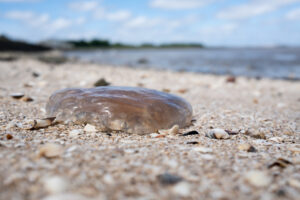Vaccines are safe, highly effective, and they work by training your immune system to respond to disease. This post breaks down why measles cases dropped dramatically after vaccination and why hepatitis B prevention matters—especially for kids—so you can make informed choices.
Jellyfish Stings in Delaware: What You Need to Know and How to Treat Them
Prepared by Atracare – Your Partner in 365-Day Urgent & Preventive Care in Sussex County
Jellyfish stings are out of control this year at the Delaware beaches. We’ve seen tons of reports, and if you get stung, it can ruin the day. That’s why we want to offer a few remedies that may help while you’re down at the beach.
Here’s what’s happening, what you need to know, and how to protect your family the next time you head to the shore.
The Jellyfish Surge: What’s Behind It?
Lifeguards from Bethany to Lewes have seen a dramatic increase in jellyfish encounters since mid-July. Experts believe changing water temperatures and wind patterns are pushing jellyfish—including the Atlantic sea nettle and other stinging varieties—closer to shore.
- Reported Cases: Some lifeguard stands have treated over 100 stings per weekend.
- Common Culprit: The Atlantic sea nettle—semi-transparent with long, flowing tentacles.
- Sting Zones: Most stings occur while wading or swimming, especially when jellyfish fragments drift unnoticed in the water.
What Happens When You Get Stung?

Jellyfish tentacles contain nematocysts, or tiny venomous barbs, that inject toxins into the skin. Reactions can vary from mild to severe, depending on:
- The species
- Sting location
- Individual sensitivity
Common Symptoms:
- Burning or stinging pain
- Red, raised welts or lines
- Swelling or itchiness
- Occasionally nausea, dizziness, or muscle cramping
Most stings are painful but not dangerous. However, children, elderly beachgoers, and those with allergies or sensitive skin should take extra precautions.
What Should Be in Your Delaware Beach First Aid Kit?
Atracare’s Approved Jellyfish Sting Beach Kit:
-
Hydrocortisone cream — apply directly on the sting to calm itching.
-
Benadryl (diphenhydramine) — helps relieve itching and swelling.
-
Pain relievers (acetaminophen or ibuprofen) — helps reduce pain.
-
Tweezers or a plastic card — to lift/scrape off any remaining tentacles.
-
Waterproof gloves — to remove tentacles safely.
-
Instant heat packs — for comfort after tentacles are removed.
Hydrocortisone cream goes directly on the sting, Benadryl (diphenhydramine) can help with itching and swelling, and Ibuprofen can help with pain. You can take the oral meds and also apply the cream topically so you get relief right away.
For families with children or elderly beachgoers, carrying this kit is especially smart.
First Aid: What to Do If You’re Stung
Atracare’s medical team recommends the following step-by-step jellyfish sting treatment protocol:
Do This Immediately:
- Get out of the water to avoid further stings.
- Use tweezers or a credit card to gently remove any remaining tentacles—do not rub or scrape.
- Rinse with saltwater, warm if possible. The warmth will denature the proteins causing the stinging and alleviate the pain.
- Apply heat (not cold) to the area:
- Immerse in hot water (104–113°F) for 20–45 minutes or apply a hot compress
Don’t Do This:
- Don’t rub the sting, which spreads the toxins.
- Don’t use urine – it’s a myth and may worsen symptoms.
When to Seek Medical Attention
While most stings are manageable, head to Atracare’s Urgent Care or call 911 if:
- You notice difficulty breathing or chest tightness
- A rash or hives spreads beyond the sting site
- The sting involves the face, eyes, or genitals
- Pain worsens despite treatment
- Nausea, vomiting, or confusion develop
- You experience symptoms of an allergic reaction
Stay Safe at the Beach This Summer
Delaware’s beaches are beautiful—but staying informed and prepared is key to a safe and fun beach day. Atracare offers fast, reliable urgent care 365 days a year, with convenient locations in Sussex County ready to handle beach-related injuries, heat illness, sunburn, dehydration, and jellyfish stings.
Get Seen. Get Better. Get On Your Way.
Need quick treatment for a jellyfish sting or any other beach emergency?
📍Visit Atracare – Open 365 Days a Year
🚶 Walk-ins Welcome | ⏱️ Short Wait Times | 🧑⚕️ Expert Care You Can Trust
0 New comments